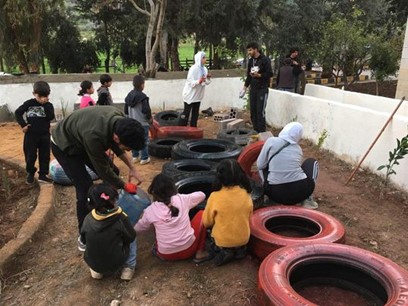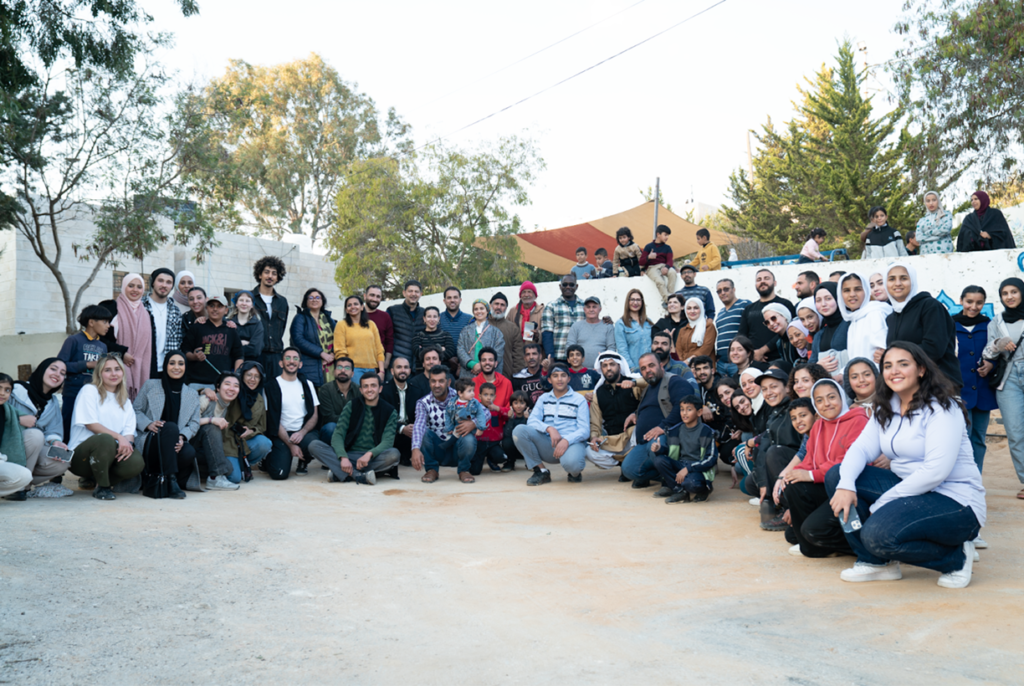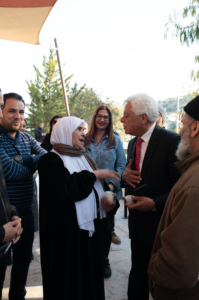- 16 February, 2024
About The Workshop
We are exploring the relationship between power dynamics among different stakeholders
within the urban governance systems
in various Arab countries and how this can enhance
the participation process in the formation of public spaces
(considered as the primary and simplest components of cities, which can be linked to localities).
OUTCOMES
- Creating a network and fostering cooperation between TU Berlin and universities in partner countries, as well as local government authorities and civil society representatives in Tunisia, Lebanon, Sudan, Jordan, Iraq, and Egypt
- Facilitating open channels of discussion and the exchange of experiences among higher education institutions, local government authorities, the private sector, and civil society stakeholders on topics related to local urban governance, participation, and urban space development.
- out participation and managing cooperation and partnerships between the university and other non-academic actors in each of the partner countries.
OUTPUTS
- Expanding contacts between TU Berlin and partner universities, local government, and civil society in Tunisia, Jordan, and Egypt, and establishing new connections with partner universities, local government, and civil society in Sudan, Lebanon, and Iraq.
- Opening channels for discussion and knowledge exchange between partner institutions and civil society through contributions to workshops and symposia.
- ting innovative and sustainable methods of communication, knowledge transfer, and experience exchange among the different partners.
Jordan Activities 2024
Day 1
Travelling participants arrived in Amman on the 16th of February. The following day all attendees met at the German Jordanian University (GJU) for an ‘Introduction and Inputs’ session. The workshop objectives and methodology were outlined and valuable insights given by a number of local and international experts as follows: Local Urban Governance and Participation in Public Spaces in Jordan Dr. Farah AlAtrash, German Jordanian University Dr. AlAtrash provided a foundational overview of the local context and urban governance system of Jordan, including an in-depth analysis of Amman's urban landscape. Inherent challenges for the region were highlighted, as well as active civil society organisations, evidence-based participatory initiatives, and case studies with SDG-aligned participatory planning methods. Habitat for Humanity: Approach, Programs and Public Space projects Mr. Mohamed Salem, Program Manager, Shelter and Infrastructure, Habitat for Humanity Jordan In Jordan, Habitat for Humanity prioritises addressing the nation's housing challenges, emphasising the demand for quality, affordable dwellings. Salem presented three organisation projects, stressing the significance of community needs assessment through focus group discussions. Also discussing the importance of ‘linking community needs with government objectives’ for practical feasibility. A Glance on the Participatory Approach for the Design of Public Open Spaces: Cases from Amman and Beirut Zeena Al Jaajaa, Head of Design, Sanabel Landscape Architecture, Urban Design and Planning Al Jaajaa methodically demonstrated the participatory planning process through two case studies from her practice. Acknowledging various challenges, including physical and non-physical aspects, Al Jaajaa emphasised the importance of understanding the local community and site-specific micro-climate, prioritising identified issues, and respecting community perspectives in problem-solving. Participatory Needs Assessment Manual and Applications Omar Eltawansy, 10 Tooba | Applied Research on the Built Environment A set of toolboxes were shared containing steps to conduct a ‘participatory needs assessment’ - a bottom-up approach that empowers communities to identify their own needs and participate in the planning process. Correctly identifying the underlying needs (rather than requested design features) was the key takeaway, these can then be met with different interventions. Public Space and Urban Integration in Berlin: The case of BENN Marzahn Humda Qamar, BENN (Berlin Develops New Neighbourhoods) Marzahn, Berlin An overview was given of BENN’s work in Berlin neighbourhoods. BENN seeks to foster social cohesion between new (often migrant) neighbours and long established ones through local-level initiatives. These involve facilitating interactions and promoting empowerment, participation and self-organisation to improve dialogue and networking. Afterwards attendees got acquainted, working groups were established (self-allocated based on interest) and survey questions prepared for the forthcoming fieldwork. In the evening the group enjoyed a walking tour of the city, led by a local guide. The main topic of the tour is about food and the city, and It included many stops, cultural insights and the chance to sample a variety of delicious local dishes.


Day 2
The second day began with a lecture entitled The Cultural Heritage of Salt: Lessons Learned for a Sustainable Urban Heritage Legacy From Arch. Leen Fakhouri, Industrial Professor, German Jordanian University Fakhouri provided insights into the local context of As-Salt, emphasising the holistic importance of heritage (encompassing physical aspects, local culture and practices) and priorities for conservation. Advocating for collaborative partnerships and community participation to ensure sustainable conservation practices, Fakhouri outlined four levels of involvement necessary when generating community-driven solutions. Afterwards students had the chance to socialise and finalise survey questions on the hour-long bus ride to Ira. Phase 2 'Fieldwork and Data Collection’ unfolded with discussions with local municipality representatives and firsthand exploration of the site. Student groups then walked to different sites in Ira to discuss with various community groups their needs and wishes for the site. Returning to Amman, students reconvened in their respective groups to compile and analyse the gathered data.


Day 3
The third phase, ‘Participatory Design Process’, began at GJU in the morning with students presenting their fieldwork findings. Afterwards local practitioners, Arch. Tha’Quba and Arch. Bilal Hammad, each gave presentations focusing on a humanist approach to urban planning as follows: Democratic Spaces - 2 Competitions Arch. Tha’er Quba, Industrial Professor, German Jordanian University Two competition entries by Quba’s firm were presented, with designs based on the principle of universal access. The practice aimed to challenge conventional capitalist norms by reconfiguring design programs to ensure that valued spaces were not available solely to the privileged, but rather 'open for all'. Spaces for people Arch. Bilal Hammad, Industrial Professor, German Jordanian University A thorough examination of Amman’s local context was shared, including its distinctive character and evolution of public spaces from the 1900s to present. Hammad highlighted the impact of political dynamics on the urban governance system, such as the deliberate limiting of public space sizes to deter demonstrations and high levels of bureaucratic complexity - often resulting in protracted processes. In the afternoon, a group session covered methodology for the workshop’s design and implementation stages. A comparative analysis of the fieldwork data was conducted and community needs prioritised for the project. Before breaking off into new self-allocated working groups to prepare preliminary design proposals and a physical site model to aid communications.


Day 4
Participants travelled to Ira in the morning and had the opportunity to liaise with local experts and trades on site before finalising their design proposals. Around midday a participatory workshop was held at the nearby Ira Youth Centre. It was an opportunity to seek community input and validate design proposals. After a late lunch on site, preparation for the ‘Implementation’ phase began. Students began to organise themselves, coordinate between groups and establish workflows. Returning to Amman, the group enjoyed a memorable dinner overlooking the UNESCO heritage cityscape of As-Salt.

Day 5
Phase 4 ‘Implementation’ saw a long, productive day onsight with active involvement from students, experts, local trades - as well as local youth and children after school got out. This was the peak point of the workshop in terms of cooperation and involvement with tangible progress being made and designs taking shape.


Day 6
The final day buzzed with productive energy on site as groups finalised their designs and then pooled together to help complete the overall project. The local youth and children were a huge help and the general sense of excitement and good will grew as the project neared completion. The day culminated with an official opening and celebration on the upper terrace. Many locals gathered, curious to see the final outcome. Local leaders and the elected head of the As-Salt municipality said a few words, while the children played happily below. In the evening, the workshop attendees had a chance to freshen up then get together for a celebratory dinner and workshop wrap-up.


Free Registration Form
Upcoming Webinars

Web programming career guideline
- 12 May, 2021
- 10:00 PM
Donec nec justo eget felis facilisis. Aliquam porttitor mauris sit amet orci.

UX / UI design guideline for beginner
- 14 May, 2021
- 10:00 PM
Donec nec justo eget felis facilisis. Aliquam porttitor mauris sit amet orci.

Product Marketing Strategies for beginner
- 20 May, 2021
- 10:00 PM
Donec nec justo eget felis facilisis. Aliquam porttitor mauris sit amet orci.

Programming Content Guideline for beginner
- 26 May, 2021
- 10:00 PM
Donec nec justo eget felis facilisis. Aliquam porttitor mauris sit amet orci.




